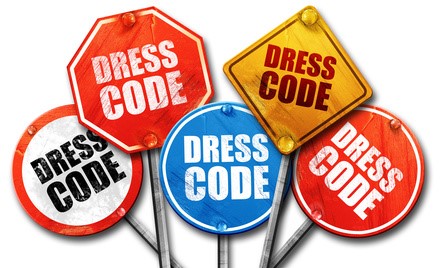Update your dress code or lose the younger workforce
Workplace dress codes are often a sign of how uptight your employer is.
Back in the day it was about professionalism and portraying a good public image. If you’re in a customer service role, this is imperative. But here’s the thing: That shit ain’t working for millennials. And guess what: This is probably the first time I agree with millennials on an issue. (I am now realizing how much of a curmudgeon I’ve become at 36.)
I never understood why guys would have to wear a suit and tie at a cellphone store. It’s true. It seems odd. Years ago when I worked in retail at one of those stores, it never made sense that I had to dress for a wedding just to talk to someone about how to download ringtones to their phone. When customers were coming in casual in sweats and a hoodie, I felt completely overdressed and out of place.
It’s appropriate to dress in a suit if you, say, work in a suit store. Sure, if I’m selling formal clothing then it makes sense that I dress the part. Or perhaps if I’m working at a high-end car dealership, then yes, I shouldn’t go to work in yoga pants.
A Manitoba politician just got called out for wearing jeans at work. This could be one of those situations where you’re a public figure and you should present yourself in a more professional manner. But for Liberal party leader Dougald Lamont, one of his counterparts made a spectacle in question period about his attire.
NDP house leader Nahanni Fontaine complained publicly about Lamont’s clothing and ultimately coerced him into changing when he later had a meeting and was interviewed by reporters.
I see both sides of this argument: You’re a political party leader in a public forum so you should be dressed up (to a point) and I understand that if you’re sitting behind a desk for hours where nobody will see your pants until you stand up for a few seconds, that it shouldn’t matter comfort-wise.
For his part, Lamont was asked about the issue and said, “This is not even worth talking about,” noting he’d been wearing jeans around the building and it had never been a problem before.
Today’s workforce is very self centred. It’s the “me” generation. If I can’t wear what I want and call the shots to a certain extent, an employer isn’t of value to me. That’s the attitude. If a company prides itself on having a relaxed “culture” — because that’s the word used nowadays — then it should allow me to dress how I want (within reason, of course).
For me, if I heard all about how fun a place was and why it’s a great time and that I’ll be so happy there but then I’m told “no jeans” — well, then, like, forget you. To me that says you are uptight and care too much about what I look like than the actual talent I bring to the team.
Maybe it’s different for me being a writer. If I were covering a formal event, sure, I’ll dress up. But to sit at a desk all day and hammer away on a keyboard and never be seen by the public, who gives a shit what I wear? Am I going to work harder because I’m wearing a collared shirt and dress pants? I’m hired for my words. If I have to wear a goddamn three-piece suit just to write this column, it’s not worth the discomfort. Screw it, I’ll work for someone else.
I previously commented about how workplace dress codes are often sexist. In the summer, women can wear dresses and skirts (read that as: show some leg) but men aren’t allowed to wear shorts. It seems like a double standard. Again, if that were the case, I wouldn’t work there.
Nearly two decades ago when I first started working, I went into a job interview desperate to make myself look good. I said anything to make the interviewer want to hire me. And they also had the same attitude. It came across that I needed to impress them to get the job. From what I hear now, it’s a completely different story.
Some of my friends and relatives in the younger generation say they go into a job interview expecting that the potential employer will sell the company to them and gush about why they should work there. They tell me that employers are quick to highlight the perks, benefits and other reasons to work there. I discovered this when I looked at some corporate websites and they have entire sections devoted to selling the company to the workforce.
“Here’s what we give you” and “Here’s why this is a great place to work” and “Here’s what’s so fun about us” are all ploys to attract workers.
Do you remember a time when you’d have to sneak off to a washroom just to check your cellphone at work? Remember that your focus had to be on your job until you had a designated break? These days if you can’t have your phone on your desk, you find that employees are less productive because they’re constantly getting up and leaving to check their phone.
I have long had issues with people focused more on their phone than the task at hand. In my book, Put Down Your Damn Phone Already, I wrote about hiring a salesperson and within minutes of him starting to work for me he had Facebook open on his phone and was messaging back and forth with his girlfriend. I put my foot down and said the focus should be on the work and to ignore social media. As an entrepreneur with a start-up business, I couldn’t afford to have someone waste their time and my money.
Things have changed. I’ve come to realize that employees expect freedom and they’re likely to be more loyal if you’re an easygoing boss. If you’re uptight and rigid, you’ll find your employ will leave you for their phones and their freedom.
It’s those little perks — wearing jeans, allowing phones on desks, having a flexible start time – that motivate people in the end. My parents wouldn’t have expected this from their employers but we’re in a different time now. This relaxed approach brings employees comfort and potentially makes them work harder.
So, if you are one of those uptight employers (which I can proudly say I’m not anymore), you might find it hard to attract and retain a younger workforce. Get with the times!



